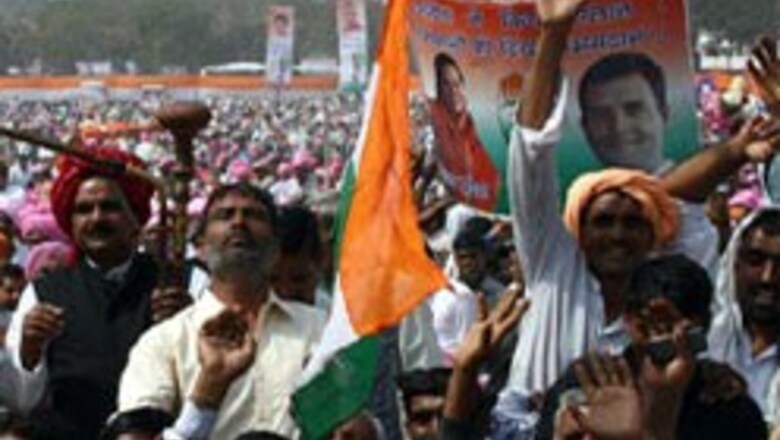
views
New Delhi: Prices are soaring and the economy is slowing as high interest rates bite, threatening to derail an election strategy the ruling coalition hopes will return it to power before May next year.
At the end of February, the finance minister drew loud cheers from governing lawmakers as he unveiled a populist Budget loaded with eye-catching tax cuts and a massive $15 billion scheme to write off the debts of millions of small farmers.
Analysts saw it as the launch pad for elections and said the government was priming its armoury should it decide to take on fired-up communist allies over a controversial nuclear energy deal with Washington, a fight, which could trigger early polls.
But the vote arithmetic now has a new focus as the cost of a bowl of rice and less happy macroeconomic indicators trump anger over atomic co-operation with the US, which the Left fears is trying to erode India's independent foreign policy.
"Nobody is going to talk about the nuclear deal, they are going to be talking about prices," C P Chandrasekhar, economics professor at Jawaharlal Nehru University, said of the likely mood among members of the ruling coalition.
Since the Budget giveaway, a rural jobs scheme that offers 100 days of paid work a year for the very poor has been extended to cover the entire country.
The Congress Party, which heads the Government, has ensured that Rahul Gandhi has been credited with propelling the project's expansion.
An independent commission has suggested pay increases averaging 40 per cent for about three million federal employees.
There being a point beyond which the warmth of feel-good politics starts to cool, momentum was building for an election to be called sooner rather than later.
Both Prime Minister Manmohan Singh and Sonia Gandhi were giving at least lip service in recent weeks to the idea elections would only be held at the end of the Government's full term in May 2009.
But party managers were seen eyeing an added bonus to an early ballot - a national election could take place alongside those in large opposition-run states where Congress could expect to pick up support from disenchanted voters.
Then a bull run in agricultural and other commodities lumbered up to the government's door, sending wholesale price inflation to its highest in more than three years at 7 per cent and triggering a flurry of import duty cuts and export bans.
Caught off-guard
Many of the inflation drivers -- hot commodity markets jumping on speculation, surging demand in Asia, bad weather, biofuels -- may be global but for India's policymakers that is scant consolation - food prices in local markets are heading north and people are angry.
"Prices of everything are going up. Prices of dal (pulses), which is our staple, could soon be beyond our means," said Premlata Singh, a 65-year-old housewife.
"My husband is retired and it is increasingly becoming difficult to survive on the monthly pension." Congress lost elections in important states last year after opposition parties campaigned heavily on an earlier round of rising food prices.
"They did not expect this," said Charan Wadhwa, a commentator on economic issues, of ministers caught off-guard by the jump in inflation. "They had everything going good for them: growth, the budget, farm loan waiver, the jobs scheme.
"Inflation has thrown a spanner in their efforts for an early election. Their own allies, the communist parties, have started protests ... and have called the government anti-people. "There is no case for early elections, not until they have controlled inflation." T K Bhaumik, chief economist at Reliance Industries, India's top private firm, said high global prices of essential commodities made fiscal steps like duty cuts ineffective in tackling price pressure but alternatives held dangers.
"There is a limit to tightening monetary policy because growth will suffer and if growth slows it will aggravate the inflationary pressures. It is a very tough situation."




















Comments
0 comment